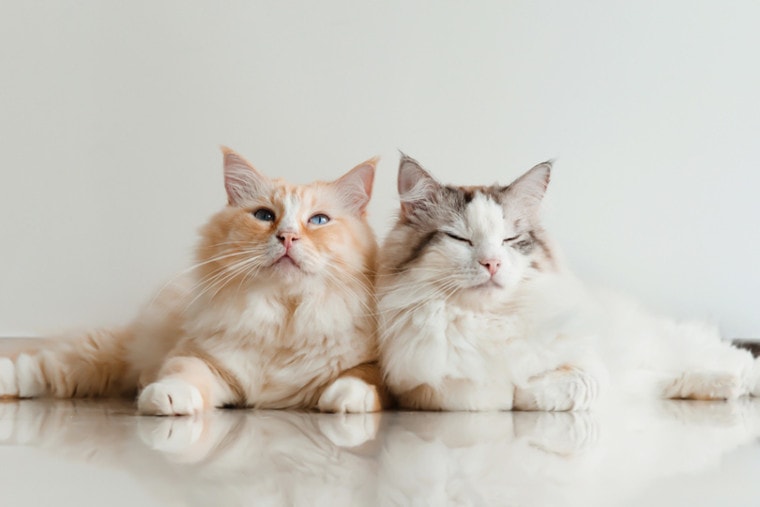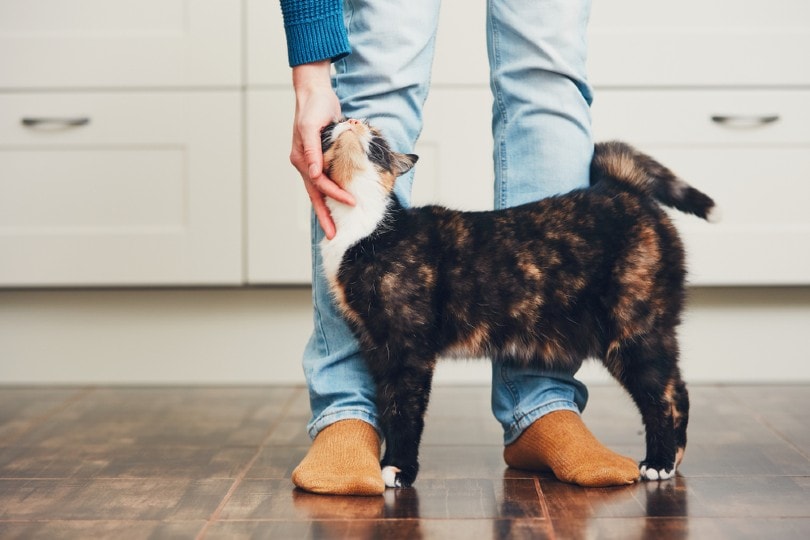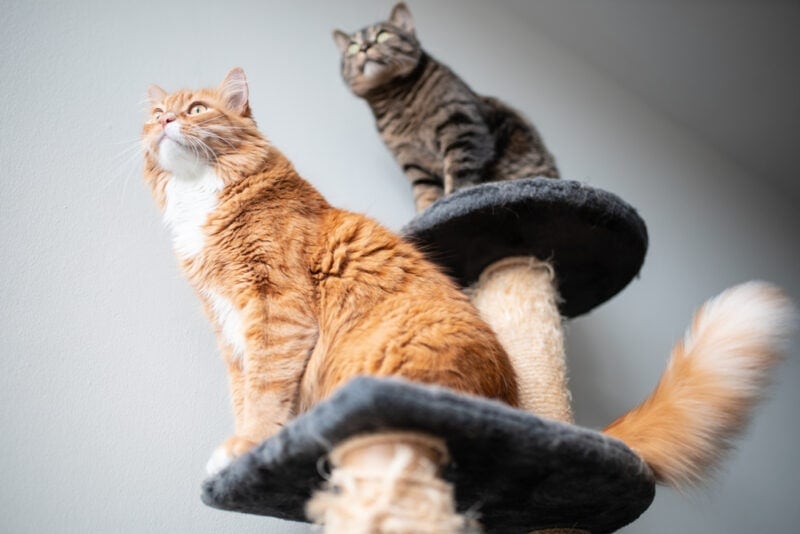
Click to Skip Ahead
Female cats often get a bad rap for being moody, aloof, and standoffish to all humans, including their owners. This causes many cat owners to prefer male cats over females. Is this assumption that male cats are more affectionate than female cats true?
Unfortunately, it’s incredibly difficult to answer this question because so many factors impact how affectionate a cat is. More important than gender to a cat’s level of affection is its personality, socialization, and sexual health. Generally, male and female cats have the same level of affection when they are spayed or neutered, and properly socialized. When they haven’t been fixed, male cats tend to be more affectionate than female cats.
If you are interested in learning about the differences between male and female cats, read on. This article explains which of the two genders is more affectionate and what factors to look out for to ensure that you get a loving and affectionate cat.
Is a Male Cat More Affectionate Than a Female Cat?
Several studies and personal anecdotes support the claim that male cats are more affectionate than female cats by nature1. This is especially true whenever the cats are not spayed and neutered, nor socialized properly. Whenever male and female cats are socialized equally and both spayed and neutered, their affectionate levels become nearly identical.
What this means is that if you do not plan to fix your cat, the male is likely to be more affectionate than the female. If you have no qualms about fixing your cat, both are likely to be affectionate. To ensure that your cat is affectionate, regardless of sex, early socialization is a must.

Why Are Male Cats More Affectionate Than Females?
So, male cats are more affectionate by nature. Why is this?
Although we can’t give an exact answer, many people speculate that the female cat’s world revolves around kitten bearing. In fact, female cats can go into heat several times throughout the year. While in heat, female cats only care about one thing and are not likely to become affectionate.
In contrast, male cats never have this issue. They don’t go into heat like females, and their entire existence does not revolve around kitten rearing. Since the male is not as focused on reproduction, males tend to be cuddlier and more affectionate to their owners.
This fact also explains why female cats get more affectionate whenever they’re fixed. Whenever the female is fixed, they don’t go into heat as before and can spend more time being affectionate to their owners.
The 3 Factors That Impact How Affectionate a Cat Is
Although males are more affectionate than females outright, many female cats are highly affectionate. Other factors aside from sex are better predictors about how affectionate your cat will be. For example, individual personality, early socialization, and reproductive health are the biggest determiners of how affectionate your cat will be, not sex.
Let’s look at each one of these factors in more detail.
1. Individual Personality
Just like humans, cats have all kinds of personalities. Even though it may be easy to chalk up the cat’s personality to its sex, all personalities are unique to the cat. Some cats will be outright more affectionate than others, just as some humans are outright more affectionate than others.
Personality can be hard to change. If you get a cat that simply is not affectionate, it will be hard to train it to be anything other than what it is.
2. Socialization
One way that you can help your cat be more affectionate, despite its personality, is through socialization. Socialization is whenever you introduce your cat to new situations, people, and animals. Cats that are socialized to humans and enjoy cuddling from an early age are more likely to be affectionate as they grow up.
If you want a super affectionate cat, you cannot ignore early socialization. When the cat is a kitten, it will be much more affectionate than it will be as an adult. Allow the kitten to be cuddled and handled so that it grows to be affectionate with age too.

- Related Read: How to Introduce Two Male Cats: 9 Great Tips
3. Spaying/Neutering Matters
Adult cats are less affectionate than kittens simply because of their reproductive health. Fixing a cat, regardless of its gender, makes it more likely to be affectionate. Both male and female cats that are fixed are more affectionate than male and female cats that are not.
This is especially true of female cats. Female cats that are fixed are much more affectionate than those that are not. When female cats are fixed, they are often just as affectionate as male cats.
Should I Get a Male or Female Cat?
If you plan to fix your cat, regardless of sex, either a male or female cat will get along great with great training and socialization. Especially if you get the cat when it is a kitten, fixed kittens grow to have good behavior and affection levels.
For people who do not want to fix their cat, there are some advantages and disadvantages to both genders. Let’s take a look at the advantages of both male and female cats when unfixed.

Male
Unfixed males are best for people who want a playful and affectionate cat. Although males will get much larger than females, many people prefer male cat’s personalities over females.
Female
Female cats are better for people who don’t want to worry about the cat spraying everywhere. Females will be more standoffish than males, but they are less likely to go to the bathroom outside of the litter box. The more standoffish nature of unfixed females also means that they are less needy and can be alone for longer periods of time, which is beneficial for some owners.
- Related Read: Are Calico Cats Always Female?
Final Thoughts
Ultimately, a cat’s level of affection comes down to its individual personality, socialization, and reproductive health. If you socialize your cat early and get it fixed, regardless of gender, it is likely to be pretty affectionate and friendly towards people.
That being said, unfixed males tend to be more affectionate than unfixed females. This is largely due to the long heat period that females experience when unfixed. Still, unfixed males aren’t outright better than females since they are more likely to spray to mark their territory.
We recommend getting your cat fixed and socializing it early. When you do these two things, the cat is likely to be affectionate and respond to training positively, regardless of its sex.
Next on your reading list:
- Are All Orange Cats Male?
- Can Cats Be Gay, Lesbian, Or Bisexual?
- Can a Male Cat Purr? Vet-Approved Facts & FAQs (With Infographic)
Featured Image Credit: xixicatphotos, Shutterstock







